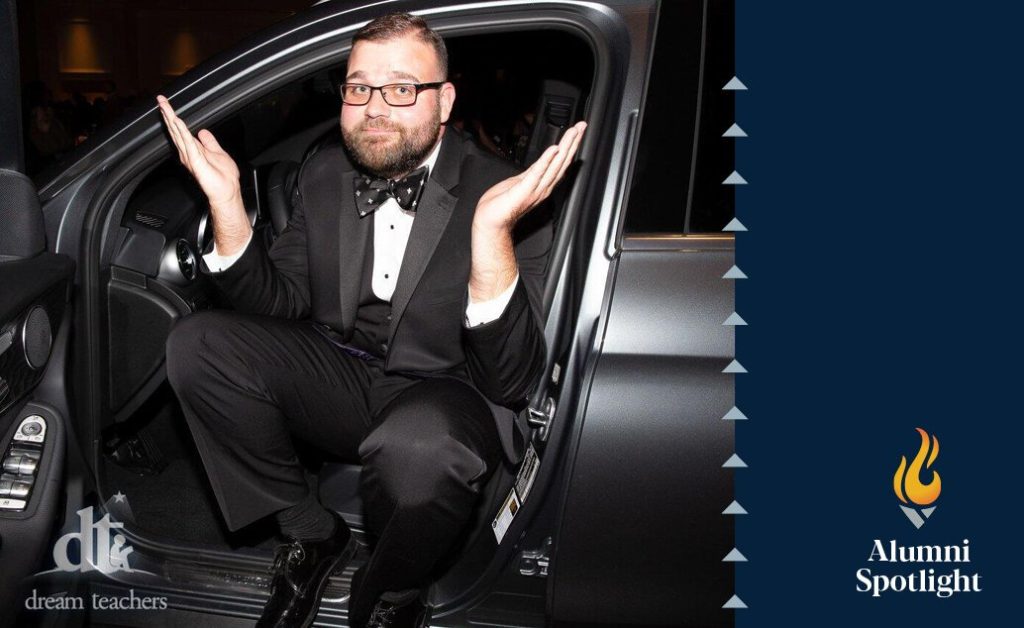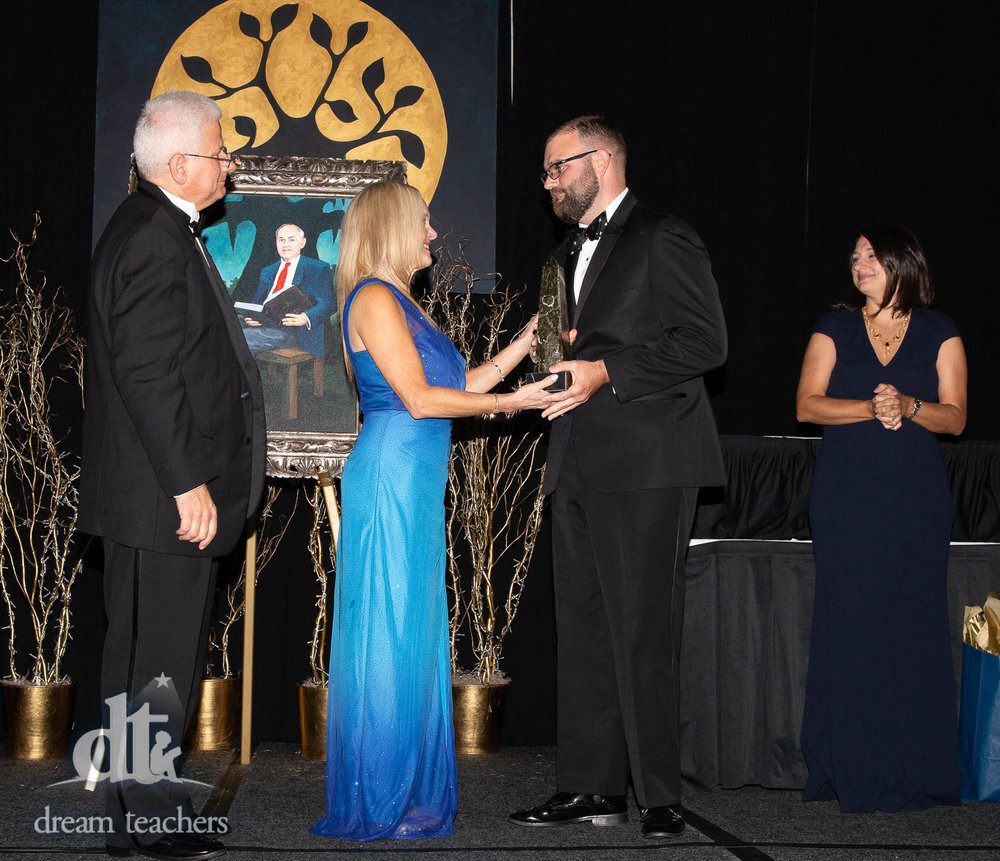
Spencer Kiper has found his “do something.”
“You know when you mix passion with action? That’s your ‘do something,’” says Spencer, M.Ed. ’13. It’s a cloudy afternoon a few days after the 12th Annual Cecil J. Picard Educator Awards Gala, where he took home the 2019 Louisiana Teacher of the Year award.
The ������Ƶ alumnus is still on a high from the ceremony as he chats with ACE about his incredible ascent post-grad.
Spencer, who earned his master’s in educational technology, leads more than 100 students at in STEM enrichment. He also moonlights as an adjunct professor at Louisiana State University at Shreveport, teaching educational technology and STEM education to pre-service teachers, and has dedicated the last four summers to serving as a professional development specialist for the Space Academy for Educators program at the U.S. Space and Rocket Center in Huntsville, Alabama.
“It’s been an interesting journey so far,” he says. “I have been teaching for seven years, going into my eighth year of teaching, and every year has been so unique, and I’m really excited to see where this opportunity lends itself to next year.”
Going into 2019, Spencer will serve as an ambassador for his district and the state in the national Teacher of the Year competition and, in just a few weeks, he’ll be off to Dubai with to train teachers from the United Arab Emirates on the latest STEM instructional practices.
Considering his momentum, it seems Spencer was destined to teach, but we wondered just when that occurred to him.

Spencer Kiper (SK): I realized it when I was about 13, 14 years old. I was doing some work as a summer camp counselor, and I realized that I really enjoyed working with youth and being a leader to people younger than me. I then pursued education – English education and biology education in my undergrad – and then became a teacher in 2011. I fell into STEM just as one of those happenstance situations with my district, and from there it’s just been a steady climb.
ACE: What’s been the greatest factor in helping you connect with your students?
SK: Learning happens organically all around us, so I strive to get my students out of the classroom as much as possible and into the places that they can potentially work in the future. When I can take [my students] to a place and have them speak directly to professionals in the fields that I would love to see them in — like medicine or advanced manufacturing — and those people themselves can say, ‘You really need to be working on these skills, because these are the skills we need you to have if you want to work here,’ that means so much more coming from that person than it does a teacher. And that doesn’t necessarily mean that I’m not doing my job as a teacher. That just means I have the [presence] to know that, while I went to school to be a teacher and to learn how to guide students effectively, I am not the end-all, be-all when it comes to subject matter knowledge. There are industry experts that we can leverage and connect our students to to get them plugged into the knowledge and skills they need to be successful.

ACE: What do you see as some of the biggest gaps and opportunities in STEM education?
SK: There’s a gap in connecting how students can take what they’re learning and parlay it into a future career or further path of study. I think where the opportunity lies is in the ability of teachers in the K-12 setting, like myself, to make connections with [the] local STEM industry, make connections with local higher ed institutions to where we are able to almost create a pipeline for our students to gain skills with us in a supportive, supervised setting, and from there head off into training programs, internships, externships, [and] residency programs.
It’s really important if you are working in a STEM enrichment field to be listening and keep your ear to the ground when it comes to STEM industry, especially in your area. In my area, what we need are students who are trained and are knowledgeable about the opportunities that exist here currently, the opportunities that will come later on down the road, and the opportunities that they themselves can bring back to the area if they have the know-how to do that.
ACE: A key focus at ACE is teaching students how to make those connections with stakeholders in the community — but what was it that set ACE apart for you?
SK: So, initially, of course, it was the cost. As a second-year teacher going into my program, I didn’t have the expendable income to pursue an advanced degree that was going to put me further into debt than what I already was in for undergrad. But past the money, what the M.Ed. in Educational Technology gave me was the ability to become a leader at my school and someone who my principals and my leadership could rely on to implement technology-based policies as they stood — and, of course, this was back in 2013. It also gave me the ability to see the trends as they were happening and steer us in the direction that I saw we needed to move toward. I was able to serve as a navigator, in a sense, so that way as new policies and new technologies came down the pipeline, I was able to sort of guide my school and administrators through the implementation process, especially when it came to tools. Understanding how trends affect education allows us to remain on that cutting-edge. When that happens, our students benefit.
And with my master’s degree, I’m also able to go work on the college level. That opportunity otherwise wouldn’t have been presented to me had I not had that degree and work experience to support it. So, with that master’s degree, I’ve been able to affect the careers of dozens of other teachers, which indirectly allows me to impact the lives of thousands of students.
ACE: Speaking of impact, was there anyone at ACE who took that same mentoring role with you?
SK: Honestly, the person who sticks out to me was my academic advisor. And it was because of that interpersonal relationship that she developed me – I mean, she knew me. Every time she picked up the phone and called me, it was like we were just continuing our conversation. There were times where I had to solve some logistical issues or had issues with the program and…she established a bond of trust with me.
ACE: Since you graduated from ACE, the awards have just poured in (Spencer won the 2016 Civil Air Patrol Aerospace Education Teacher of the Year award and the 2017 Henry Ford Teacher Innovator Award, in addition to the 2019 Louisiana Teacher of the Year award). How do you keep up that drive when you’ve accomplished so much?
SK: There’s still so much work to be done – so much work. I just hope that my track record really inspires other educators to find their “do something.” I’m able to put steps into place where I can make an impact on a large scale, but at the core of who I am, I believe every teacher has that ability.
Learn more about the M.Ed. in Instructional Design and Educational Technology program at ������Ƶ.

